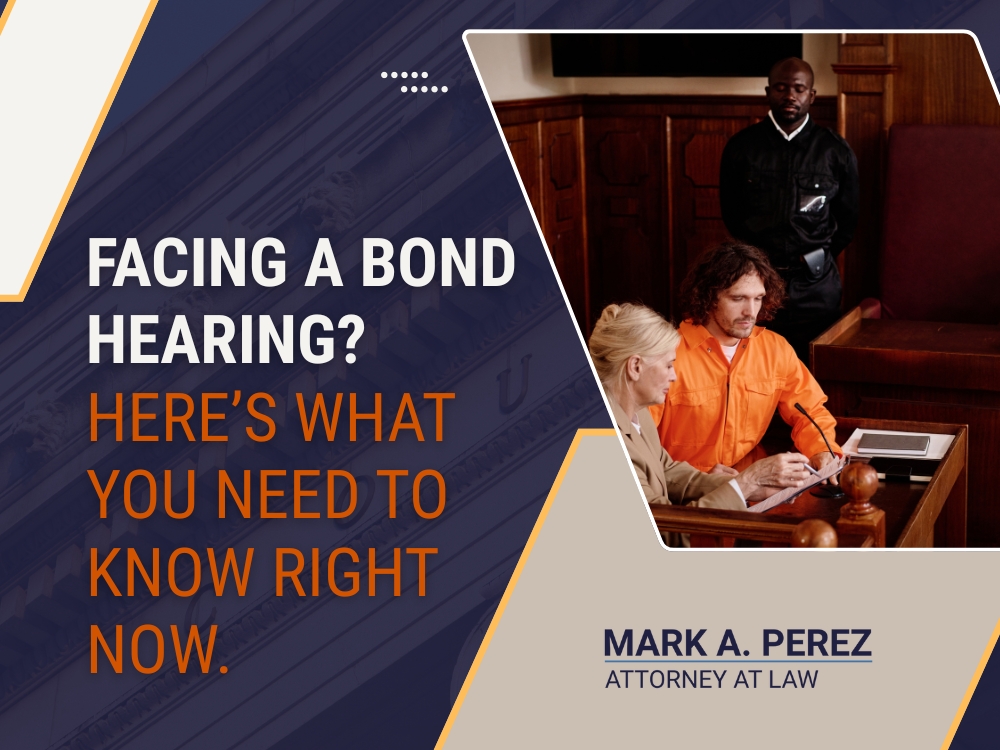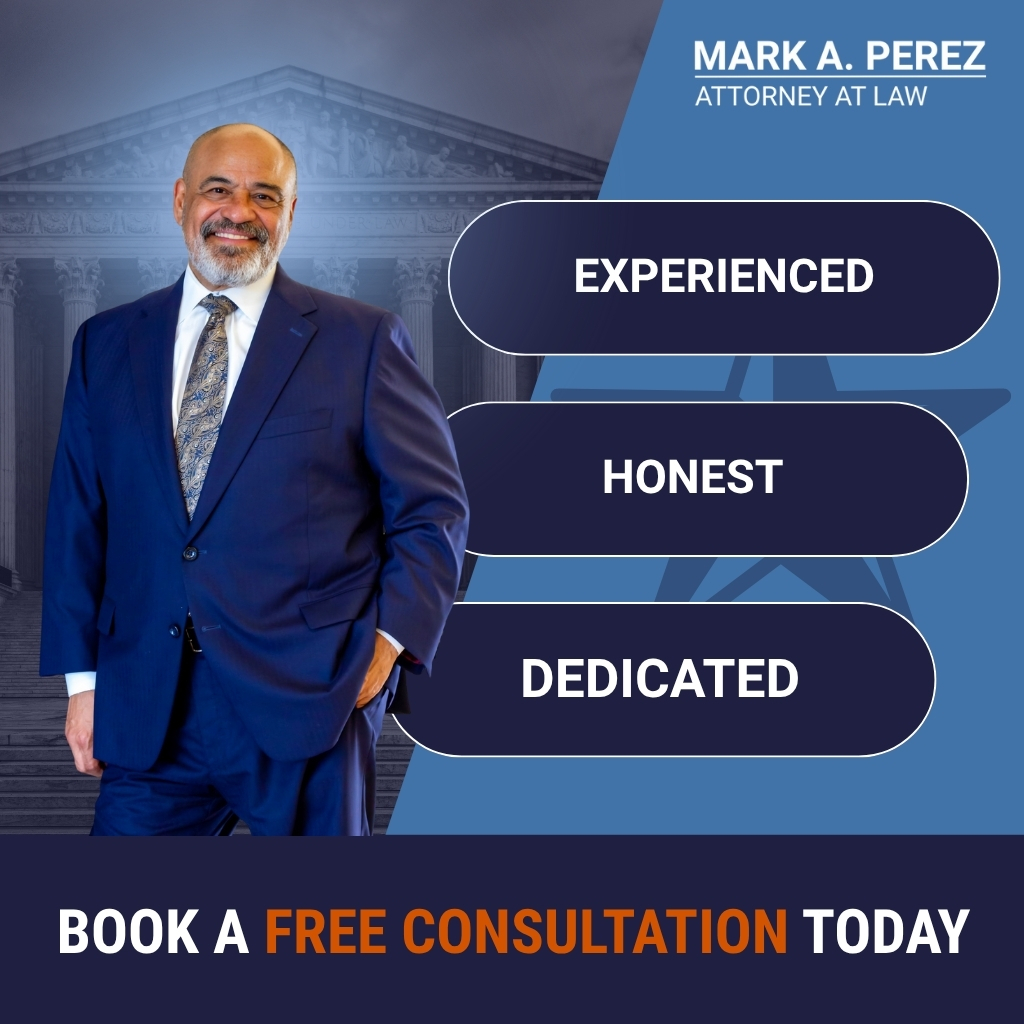Bond Hearing
MARK A. PEREZ, ATTORNEY AT LAW
What Is a Bond Hearing?
If you or a loved one has been arrested, you may be wondering “what is a bond hearing?” A bond hearing is one of the first court proceedings after an arrest. At this stage, the judge decides if you can be released from custody and under what conditions. The focus is not on guilt or innocence but on whether you can safely wait for trial at home.
Many people confuse a bond hearing with a trial. A trial determines guilt, while a bond hearing only addresses release and bond amount. The term “bond” refers to the guarantee—whether money or a promise—that ensures you return to court. “Bail” is the process that allows release once the bond is set.
Bond hearings usually take place within 48 to 72 hours after an arrest. In court, you’ll see the judge, prosecutor, your lawyer, and sometimes family members there to support you. If you or a loved one has a bond hearing coming up, talk to Mark A. Perez today to make sure your rights are protected from the very start.
Table of Contents
PROTECTING YOUR FUTURE AND YOUR LIBERTY
If you're facing criminal charges, don't gamble with your future. Call me today.
What Happens at a Bond Hearing?
Before deciding, the judge considers factors such as:
- The seriousness of the charges
- Past criminal history
- Employment status
- Community ties
- Risk of failing to return to court
The prosecutor may argue to keep you in custody or set a high bond. An experienced bond hearing lawyer can counter by showing you’re not a danger, that you have responsibilities like work and family, and that you can be trusted to appear in court.
Outcomes vary. You may be released without bond (personal recognizance), released with a set bond, or denied bond if the judge sees too much risk. The decision is usually quick but has an immediate impact on your case and your life.

Can Charges Be Dropped at a Bond Hearing?
Bond hearings are not meant to dismiss charges, but some issues can surface that may help your case later.
Why Charges Usually Are Not Dropped
- The hearing is focused only on release, not guilt or innocence.
- The prosecution usually has enough basic evidence to proceed.
When Problems May Arise
- Errors in filing charges – If charges are filed incorrectly, your lawyer may raise this issue.
- Weak or missing evidence – If the prosecution cannot present even minimal evidence, it may raise questions.
What Is an Appearance Bond?
An appearance bond is one option the court may use to allow release.
How It Works
- You are released on the promise to appear at all hearings.
- It usually does not require full cash up front.
How It Differs from Other Bonds
- Cash bond – Requires full payment before release.
- Surety bond – A bail bondsman guarantees payment if you don’t appear.
- Appearance bond – Relies mostly on trust and your word to return.
Consequences of Failing to Appear
If you miss court:
- A warrant may be issued for your arrest.
- The bond can be revoked.
- You may face additional charges.
Judges are more likely to allow appearance bonds when the charges are not severe, the person has steady employment, and there are strong ties to the community.
Don't Wait. Call Us Today!
Why You Need a Bond Hearing Lawyer
The outcome of a bond hearing determines whether you go home or remain in custody while awaiting trial. A bond hearing lawyer can:
- Emphasize your character, responsibilities, and community ties
- Argue against unreasonably high bond amounts
- Suggest alternatives such as reduced bond or electronic monitoring
- Protect your rights from the start
Having a bond hearing lawyer early ensures your case is handled carefully from the beginning and gives your family peace of mind.
Frequently Asked Questions About Bond Hearings
How long does a bond hearing take?
Most bond hearings are short, often lasting less than 30 minutes. The judge reviews basic information, hears arguments from both sides, and then makes a decision about release and bond.
What should I wear to a bond hearing?
It’s best to dress neatly and respectfully, as first impressions matter. Business casual clothing—like a collared shirt or modest dress—shows the court that you take the process seriously.
Can my family speak at a bond hearing?
In some cases, judges may allow family members to be present to show support. While they usually don’t speak directly, their presence can show the court that you have strong ties to the community.
What happens if I can’t afford the bond?
If the bond set is too high, your lawyer can request a lower amount or propose alternatives like electronic monitoring. Families sometimes work with bail bondsmen, but your lawyer can also fight to make bond more manageable.
Is the bond money returned after the case?
Yes, in most cases bond money is returned once the case is finished, as long as you attend all court dates. However, some fees may not be refundable, especially if a bail bondsman was involved.
What if bond is denied?
If bond is denied, you may remain in custody, but your lawyer can ask the court to review the decision later or appeal it in some situations.
Talk to Bond Hearing Lawyer Mark A. Perez About Your Bond Hearing
If you or someone you care about has a bond hearing coming up, it is not something to take lightly. The judge’s decision can affect your freedom, your ability to work, and your chance to prepare for trial outside of jail.
I work closely with clients and their families to prepare for these hearings. My role is to present the strongest case possible for release, argue for fair bond amounts, and make sure your rights are protected at every step.
Do not face a bond hearing on your own. Call my office today 214-441-7882 to schedule a consultation and let me help you through this critical stage of your case.

